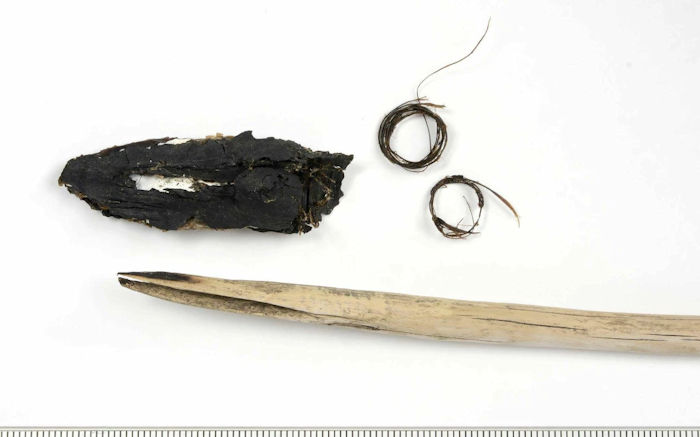Conny Waters - AncientPages.com - The ice in Norway continues to melt, and glacial archaeologists are discovering more and more unique ancient artifacts. This time, scientists from the Secrets of the Ice project found 3,500-year-old arrowheads made of shells that melted out of the ice.
The researchers say the arrowheads were in use only a couple of hundred years, and nobody knows why.
The arrowheads of freshwater pearl mussel were found together with shafts and sinew. The scale at the bottom of the photo shows millimeters.Credit: Photo: Museum of Cultural History, Oslo
“Why they chose to use shells to make arrowheads is something to ponder,” says archaeologist Lars Pilø.
“Folks at the time did have access to stone which can be used to make arrowheads, and they also used bone and antlers,” he says.
“Our glacial archaeologists were very surprised when the first arrowhead made from mussel shells melted out the ice. Now they have found a total of three,” Pilø tells sciencenorway.no.
In addition, some such arrowheads have been found in two other locations in mid-Norway.
“We have also found arrow shafts with the same type of fixing. These have most likely also had shell arrowheads,” Pilø says.
The archaeologists have also found the sinew used to bind the arrowheads. At the other end of the arrow, the shaft has been fitted with feathers.
The arrowheads are probably made out of freshwater pearl mussels - Margaritifera margaritifera.
Short time period
According to Science in Norway, "the finds were made in a small area, and stem from a short time period.
“This has been a short-lived tradition, from the Early Bronze Age around 3,700 to 3,500 years ago,” Pilø says.
The freshwater pearl mussels have probably not existed in the areas where the arrowheads were found. The arrows have apparently been made in the lowlands, and then hunters have brought them up in the mountains to go hunting.
When several thousands of years old ice melts, archaeologists are finding incredibly well-preserved items.
“Objects that have been encapsulated in the ice have in a way become frozen in time. They don’t age. This way also the organic material is preserved,” Pilø explains.
A different kind of find
Professor of archaeology Christopher Prescott at the University of Oslo also talks about these unique conditions of preservation:
“Mountain archaeology has a long history in Norway. The interesting things is that they can find these organic components,” he says.
Usually, when archaeologists excavate an open area, they only find the hardest
materials.
“We know that human culture also consists of many other things. I have myself found pearls made from mother of pearl which were more than 4,000 years old. Shells are a part of this type of find, but as far as I know this is one of few or perhaps the first time that such arrowheads made from shells have been found,” Prescott says.
Going hunting
And in keeping with this, Lars Pilø talks about the find as breaking news.
“Arrowheads made from mussels were completely unknown in Norway before the melting started, and they have not been found anywhere else in the world,” he says.
What archaeologists do not know yet, however, is what it was like to go hunting with shell arrowheads.
“The only way to find out is to do experimental archaeology, meaning we will make and try to shoot with a few different types of arrowheads,” Pilø says.
“For the hunter this was about needing the arrowhead to penetrate the animal and create a proper wound. I would imagine that sharp mussels are quite well suited to do so,” he says.
See also: Rare Ancient Clothes And Shoes Found Under The Ice At The Lost Lendbreen Mountain Pass
Written by Conny Waters – AncientPages.com Staff Writer






